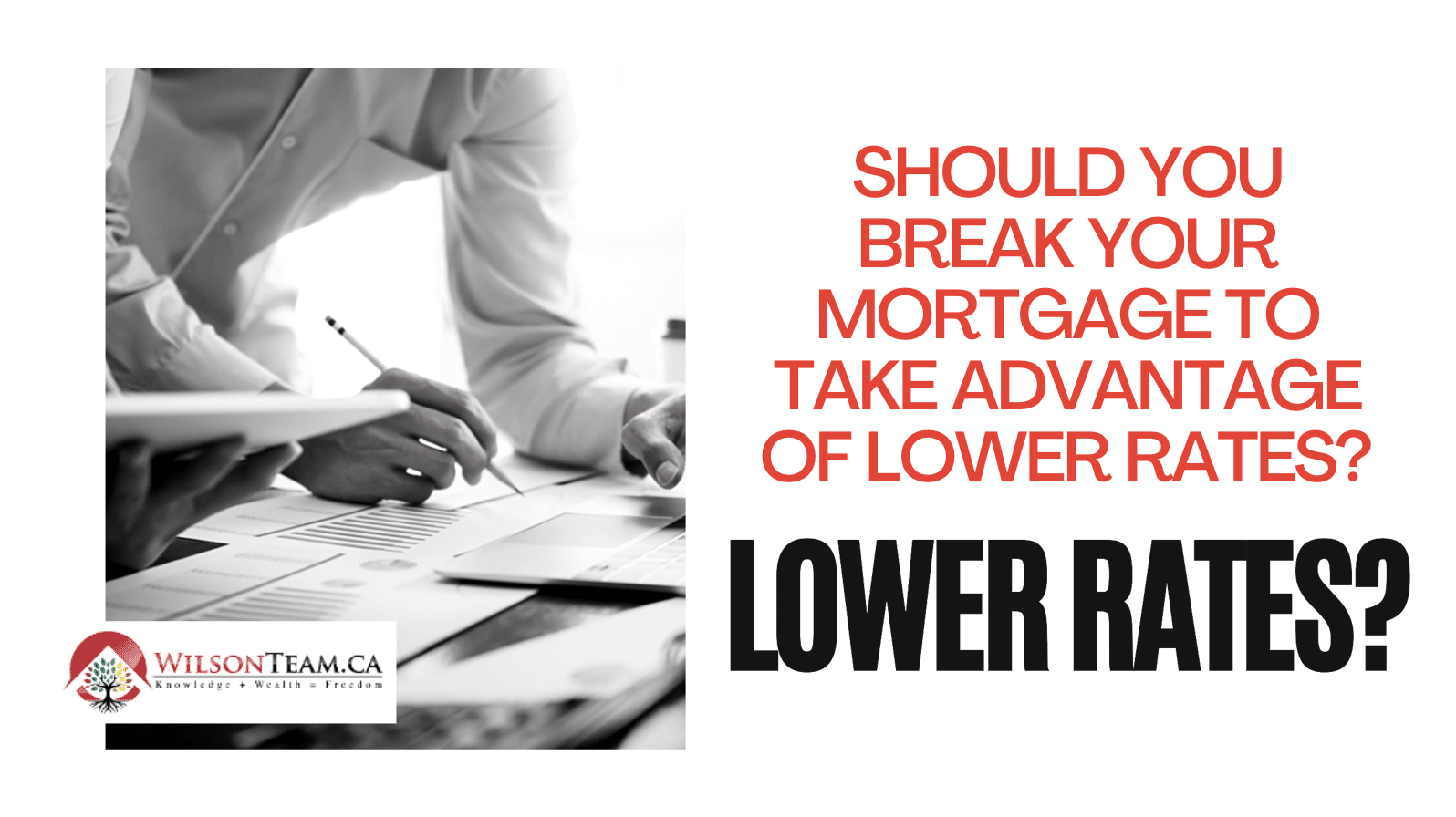Should You Break Your Mortgage to Take Advantage of Low Rates?
To break or not to break your mortgage, that is the big question during this unprecedented period of low interest rates.
In response to the economic slowdown caused by COVID-19, the Bank of Canada slashed its overnight lending rate to 0.25 percent and banks responded by dropping their mortgage interest rates. As of mid-October, it was possible to find rates as low as 1.59% for a 5 year fixed rate.
As a homeowner, these low-rate mortgages are mighty tempting – so tempting that you’re wondering whether to break your existing mortgage to take advantage of such great deals. Who wouldn’t want to see their monthly payments drop by a few hundred dollars?
Before you take the leap, however, confer with you’re the Wilson Team Ottawa Mortgage Brokers of mortgage professionals and do the math to be sure you will come out ahead. There are two costs you’ll need to be prepared to pay. First, you’ll need to have the lawyer change the financing on the title, a charge that may be partially covered by your new lender. Breaking a mortgage generally comes with a prepayment penalty, too, and you’ll need to decide whether your term savings with a new deal will balance your losses in penalties and fees. The penalty is usually three months’ interest or the interest rate differential (IRD) payment, whichever is larger. Keep in mind the IRD is different at each bank so what is good for one bank is very different at another bank even if you have the same rates, terms and balances. Many consumers do not understand how different it is. If you take a $350,000 mortgage with a 3% mortgage rate can be as low as $3800 at once bank and as high as $15,000 at another bank. Let us help up you crunch those numbers before you do something you’ll regret. Be aware that penalties are subject to change, so they may have climbed as interest rates have fallen. If you had a rate quote longer than 1 month ago then it may be best to call again.
Mathematical Examples:
Let’s say, for instance, that Sue and Sam have a $400,000 balance and two years to go on their five-year, four percent fixed-rate mortgage and the penalty for breaking it is either three months’ interest or the IRD.
Calculating their three-months’ penalty:
Mortgage Interest rate x Mortgage Balance x (Months of Penalty/12) = Mortgage Penalty
0.04 x 400,000 x (3/12) =16,000 x ¼ = $4,000
Calculating potential savings using penalty:
[Mortgage Balance x (Contract Rate – New Contract Rate) x Years Remaining] – Mortgage Penalty = Mortgage Savings
[400,000 x (0.04 – 0.02) x 2] – 4,000 = $12,000
With potential savings of $12,000 and a mortgage penalty of only $4,000, it makes sense for Sue and Sam to break their mortgage if they are charged 3 months’ penalty in interest.
Calculating their IRD payment:
(Posted Rate – Current Rate) x Mortgage Balance x (Months Remaining/12) = IRD
(0.04 – 0.02) x $400,000 x (24/12) = $16,000
Calculating potential savings using IRD:
[Mortgage Balance x (Contract Rate – New Contract Rate) x Years Remaining] – Mortgage Penalty = Mortgage Savings
[$400,000 x (0.04 – 0.02) x 2] – $16,000 = 0
With no savings in sight with the IRD method, it’s silly for Sue and Sam to break their mortgage, unless they are in need of greater monthly cash flow that the new lower mortgage rate will allow.
NOTE: If you do decide to refinance and don’t have the cash on hand to pay the penalty, lenders generally allow you to add $3,000 to your mortgage to handles penalties and fees.
Why Refinance?
There are a few different reasons you might want to consider refinancing but be careful – if your financial situation is uncertain during COVID-19, it may not be a good time to refinance, no matter how tempting. Your Wilson Team Ottawa Mortgage Brokers can help you decide if the time is right. Meanwhile, consider these reasons for refinancing, as well as some alternatives:
- Lowering your interest rate. A lower rate can save you money over the term of the mortgage, as well as cost you less in interest over the term of the loan. However, lenders are protecting themselves from the uncertainties of the economy during the pandemic by adding a risk premium to their rates. So, the rate you’re offered may not be as low as you imagine. Be sure it makes sense financially.
- Consolidating debt. Mortgage loans carry much lower interest rates than credit cards or personal loans, so, by taking out a larger mortgage than you need, you can use the extra funds to pay down more expensive debt.
- Accessing equity. If you need some extra cash right away, you can take out a larger mortgage than required and use the extra cash for whatever emergency or large expense that is beckoning. However, given that it’s a new mortgage, your early payments will consist largely of interest, so be sure you really need that money. Perhaps you can consider applying for a home equity line of credit (HELOC) to meet those needs instead. NOTE: If your existing mortgage doesn’t provide for a HELOC, you can have one added to your new mortgage when you refinance.
Obviously, if you’ve lost your job or are having trouble paying your existing mortgage during COVID-19, refinancing isn’t the best way to free up cash. Perhaps you can turn to family for help or apply for some of the pandemic-related government assistance now available. Mortgage deferrals, which were available earlier in the pandemic, are coming to an end, but you can certainly check with your lender to see what’s possible.
Whatever you are considering, it’s worth touching base with your Wilson Team Ottawa Mortgage Brokers; it’s always worth obtaining professional insights, and helpful to have a sounding board.




